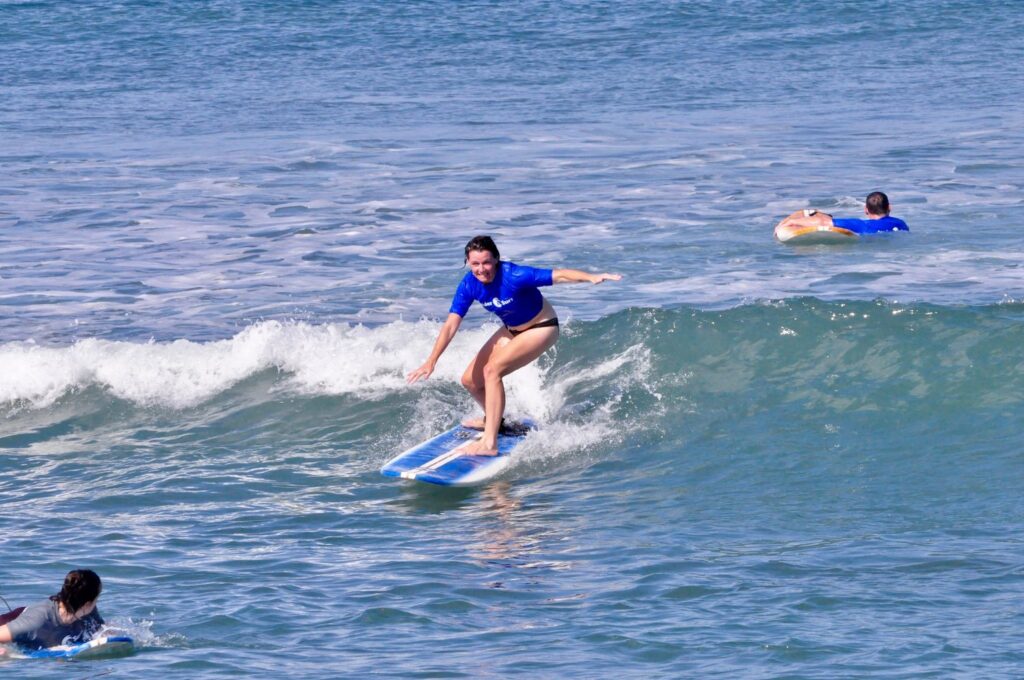Surfing isn’t the most demanding sport on the planet. But in case you are ready to give it a go, you will find several things you need to know before living the dream.
The very first thing you have to have in mind is actually that surfing is not a thing that you try during summer vacations and definitely not a cool pastime that can be enjoyed any day of the season.
Surfing is actually a sport with a large number of details, techniques, and gear hacks. It can also put the life of yours at risk, so there is no way you can basically purchase a board and chase probably the best waves on the planet.
Surfing requires training and dedication. The greater number of waves you catch, the quicker you will learn and progress.
That said, the great news is the fact that learning the basics is fairly quick and uncomplicated. When you grasp the concept behind the wave and the surfboard, you are prepared to get wet.
As you advance through to advanced and intermediate levels, there’ll be a lot more to improve, correct, and polish. But that is another dance.
Click here to know more about Surf rentals, just click here Surf rental Seignosse
The More You Practice, The Faster You Will Learn
So, how fast are you able to learn to surf? Just how much time do you have to stand up on a surfboard and glide across the glassy waves?
Learning to surf requires between 2 hours and one month of practice. When you are struggling for over 2 months to ride a wave, you have a problem.
The very first thing you will have to master is actually lying and balancing on a surfboard – that could get you between half-an-hour and 2 or perhaps 3 hours.
The next thing is to paddle for a wave and catch it – that is another hour or perhaps 2, based on the fitness level yours.
Lastly, probably the hardest part, the pop-up move. You will fall off the surfboard a lot and get pounded by closeout waves. It is going to happen fifty times or even more, and that is fine.
Nevertheless, if you overcome that initial frustration – and later or sooner, you’ll – it will be like riding a bike. When you get used to it, it is for life.
Individuals who book weekend surf lessons are likely to learn slower than newbies who own a board and hit the water 2, 3, or perhaps 4 times a week.
According to your commitment, aptitude for water sports, and physical exercise in general, you might not need time that is much to make the title of surfer.
Age isn’t a decisive factor either. A proper and fit 60-year-old beginner will always learn faster than an obese 16-year-old starter.
Thus, although it may not be possible to tell precisely the amount of time required to ride a wave, we can say that equipped with a wide and big surfboard, a total of between 5 and twenty hours are enough.
The vast majority of beginner surfers fit in the above parameters. Next, it is just a matter of motivation, patience, and persistence.
The greater number of waves you catch, the better you receive. The more you observe others, the quicker you will learn. The more you would like it, the quicker you will trim a wave.
Probably the most common problem beginners surfers struggle with is actually foot positioning. Typically, they are way too far back on the board.
Surfing involves a series of mental and physical skills that must be considered by someone who wants to participate in it and enjoy the experience to probably the fullest.
The quality of the waves, the regularity of practice, the swimming skills, the ocean’s expertise, and the appropriate equipment will also speed up or perhaps slow down the learning curve.
Nevertheless, the most important characteristics are actually as follows:
Endurance, Strength & Power Paddling is undoubtedly some of the most demanding surfing skills since you’ve to find out how you can balance on a surfboard and then paddle for the waves simultaneously.
There is quite a lot of paddling in surfing since you will have to get out-the-back whenever you complete a wave, correct your position constantly, and, last but not least, paddle for probably the best waves.
Your stamina and strength levels will be put to the test, particularly when you are in the water for over an hour.
Surfing could be an intense outdoor activity, and brief bursts of energy are sometimes needed to overcome the natural liquid challenges.
Agility & Flexibility People normally refer to surfing as an action sport. And they are right.
Surfers must be in relatively good shape to respond to the actions of the waves. It is a motion sport, so you are expected to bend your knees, rotate the hips of yours, shift your feet forth and back, etc.
In case you cannot get from a prone to an upright position relatively fast, you will not be in a position to take off on a wave and ride it in a standing position.
Waves are continuously forcing us to adjust the surfboard and the body stance to their unstoppable breaking force.
Nerve
It is paramount that anyone that takes on surfing feels comfortable and confident in the waves and the water.
Without the proper spirit, a first-timer will not learn the tricks of the trade. Do you fear small waves? When your answer is yes, then you should probably try another sport.
In conclusion: surfing stands roughly in the middle of the “Degree of Difficulty Sports Ranking.” It’s not as difficult as gymnastics, wrestling, tennis, and slightly harder than bowling and badminton.
Click here for Location de matériels de surf Seignosse

